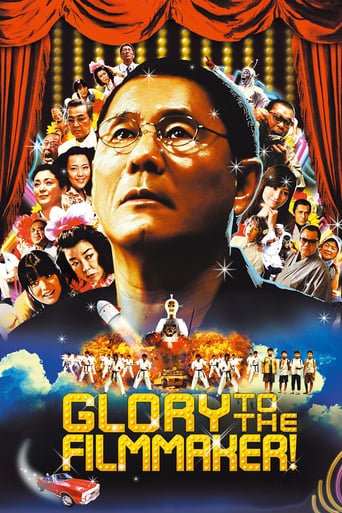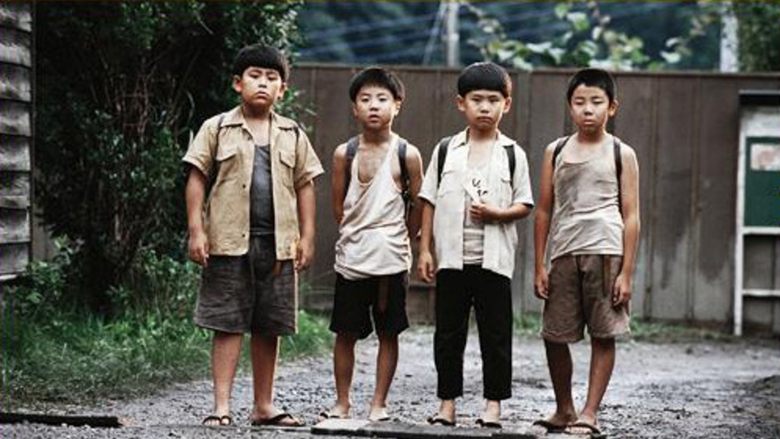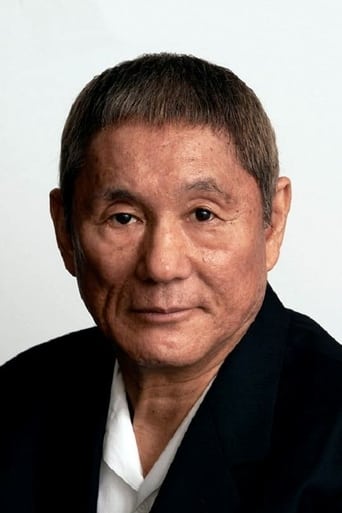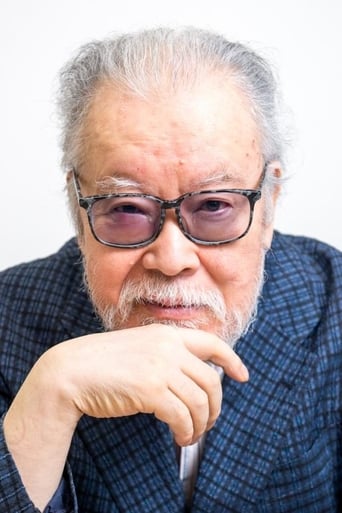Glory to the Filmmaker! (2007)
Takeshi Kitano plays a version of himself in which he's a struggling director cycling through a number of different genres in an effort to complete his latest project.
Watch Trailer
Free Trial Channels
Cast


Reviews
the leading man is my tpye
A lot of fun.
This is a small, humorous movie in some ways, but it has a huge heart. What a nice experience.
The best films of this genre always show a path and provide a takeaway for being a better person.
How many truly unique films have come out since the year 2000? Not too many. In an age of remakes, rehashes, and parodies, where every film by every director looks exactly the same, it's hard to find an innovative film, especially in the "comedy" genre. Yet once again Kitano delivers in this surreal comedy gem that is unique, deeply personal, affecting on a spiritual level, and is absolutely HILARIOUS.Takeshi's previous film, "Takeshis'" was a surreal compilation of every film Kitano had made prior to it. This film is something of a compilation of all the kinds of films he hasn't made yet. The first half of this film explores that to a hilarious degree, but the second half is when this film really shines. Some of the most off-the-wall, UNREAL humor I've ever seen in a film, specifically a brief animated part near the end that is probably the greatest scene I've ever seen in a film, period.Though for nostalgic reasons, my PERSONAL favorite Kitano films will always be "Hana-Bi" and "Sonatine", I have noticed that Takeshi has actually been getting better and better in recent years (excluding "Zatoichi") as he is starting to explore the more surreal, beautiful, and bizarre moments only hinted at in his first few films. Indeed, like many people, I find Takeshi to be the best director currently working in the world today, and his films are always gems... he's completely tearing apart the very essence of cinema, yet still not jumping into a black hole of impenetrable artiness. "Art for art's sake", maybe, but this is still some brilliant, hilarious stuff, and I'm very happy Takeshi is taking all the money he earns from his acting and personal appearances and pouring them into these brilliant films. The "critics" and Japanese audiences may not care for them, but I'm sure in 10-20 years from now, these films be looked upon as classics of cinema.
Beat Takeshi's Glory to the Filmmaker, in the first instance, is difficult to rate. Its merits are clear, but its failures are even more striking. It is second in his supposed trilogy of self-critical, self-reflective, self-mocking metamovies. Having given up on his increasingly mainstream audiences (the accolade he received after Zatoichi), Beat Takeshi is trying to bring the "Beat" back into the mix. It remains an open question whether his methods are to be applauded or lamented. Here, in this film, Kitano widens the schism between himself, the auteur, and the movie-going audiences, by techniques of alienation that are borderline sado-masochistic. The salvaging fact is the comedy of the film, which shows Kitano's long-standing background as a comic. He has shown this side of his psyche only very rarely in his films. So, I am torn between appreciating the light-hearted spirit of the film and castigating, as I should, its heavy-handed pacing and direction.But let's look back for a moment... The film that started off this self-reflective trilogy two years ago, Takeshis', I really enjoyed (especially after repeated viewings), because it culminated his career up to that point. This current film does not achieve, or even try to achieve, anything of the sort. It does not reflect back as much as make fun of any sense of history and continuity. It is a meta-movie, a non-movie, a post-movie... and, underneath it all, a series of quirky scenes, gags and fragmentary ideas. The humour of the film is its driving force, making it closer to his comedy Getting Any (1995) than anything he's done before or since. But one has to wade through a pool of dragging nonsense to get to those tasty bits, for which reason I cannot recommend this film as a comedy.At parts, I found the film pretentious, self-righteous and uninvolving. In a word, it's too self-conscious to be a comedy. During some other scenes I was completely at loss of words (whether because of the film's absurdity, incoherence or its complete disregard for the audience), to the degree that I simply decided I would postpone my judgment for some other day... Well, that "other day" is today, but I still can't make up my mind... The movie disarms the viewer, but it does not live up to much, either. It's like an extended foreplay.All in all, one has to appreciate Kitano's vision and uniqueness, but this film works best as a meta-statement of the art of movie making and not so well as a comedy, a drama or anything else. Most viewers will probably find it to be, rightly or wrongly, an irredeemable piece of trash.I kinda liked it. It's not good enough to classify as Dada, but it's just a notch above kitsch.
So.. Kitano has a sense of humor after all! Just kidding. The movie has some points for the general audience but most of it requires some background in history of Japanese cinema, kitano's career, kitano way of life, etc..So if you really want to see everything from Kitano's factory it's OK to watch, if you are really knowledgeable about all that stuff you probably got to watch it, but if you are neither one of them then you'll do fine without even knowing that it exists, although if you watch it (and have the presence of mind of not expecting much of it) then you can have a reasonably good time with it.Kitano is having a hard time accepting he is meant to make movies of a special kind which is not the case of this movie.. He even mentions it in the movie: "I said I wont do another movie with violence and I got to stick to it" Well.. I'm afraid our dear Mr Kitano will have to swallow those words sooner or later, preferably long before he runs out of money.
Seen in the Toronto International Film Festival After a series of Kitano classics culminating in the highly and widely acclaimed "Hana-bi" (1997), the master of avant-garde Japanese gangster movies wanted to venture into other genres. "Kikujiro no natsu" (1999), a heart-warming road movie (in some ways not unlike Brazil's "Central Station" (1998)) is a favourite of mind. After another brief re-visit to the gangster genre with "Brother" (2000), he tried something else rather surreal "Dolls" (2002) which received a general verdict of beautifully filmed but too obscure to understand. Then came a very main-stream "Zatoichi" (2003), his reinvention of the popular iconic blind swordsman in the 60s, which was good enough to win the "people's choice" award in that year's TIFF. But it has been 4 years since then and there was nothing of any significance coming out of him This latest work, "Glory to the filmmaker" seems to serve a dual purpose yet another attempt to do something different, and also his own personal statement about his frustration with not having any more inspirations. There could actually be a third message, a lament of the current state of affair of the Japanese film industry.The movie starts by showing Kitano's proxy, a full-size blown-up doll of himself, going through a series of medical tests, ending with a scene in the consultation room where the doctor says to the doll, "Next time, send himself". It's kind of difficult to decide which one of them is more expressionless, the doctor or the doll.In the rest of the movie, we see Kitano walking around with this doll, as well as appearing in scenes interchangeably, as the plot (if it can be said to have one) unfolds under an ever-present voice over narrator. Essentially, the first half is about numerous attempts he himself makes with various genres, from traditional Ozu to trendy Hollywood CGI Sci-fi, and everything in between. The second half seems to talk about what he finally ends up making, a story about a mother-daughter team of con artists whose target is a character played by himself. Playing the daughter is 20-year-old Anne Suzuki who, after some minor roles, came to herself in "poetic director" Shunji Iwai's "Hana and Alice" (2004) and later took part in "Initial D" (2005), Hong Kong's rendering of Japan's immensely popular car racing manga.Turning back to "Glory to the filmmaker", the material in the loosely linked comic sketches appears to be drawn from Kitano's own earlier standup comedy routines as well as Monty Python, the two prime suspects. There are some really funny moments but the movie is not devoid of stretches of banality. The most brilliant gag is an illuminating comment made by one of the characters toward the end, to the effect that whenever times go rough, our protagonist would turn into a mute blown-up doll. What empathy! Isn't that what we all would love to do.The movie concludes with a very clear message. Kitano is back in the consultation room, himself rather than the doll, to hear the final diagnosis. "There's a problem with your brain," explains the doctor, "it's broken".








